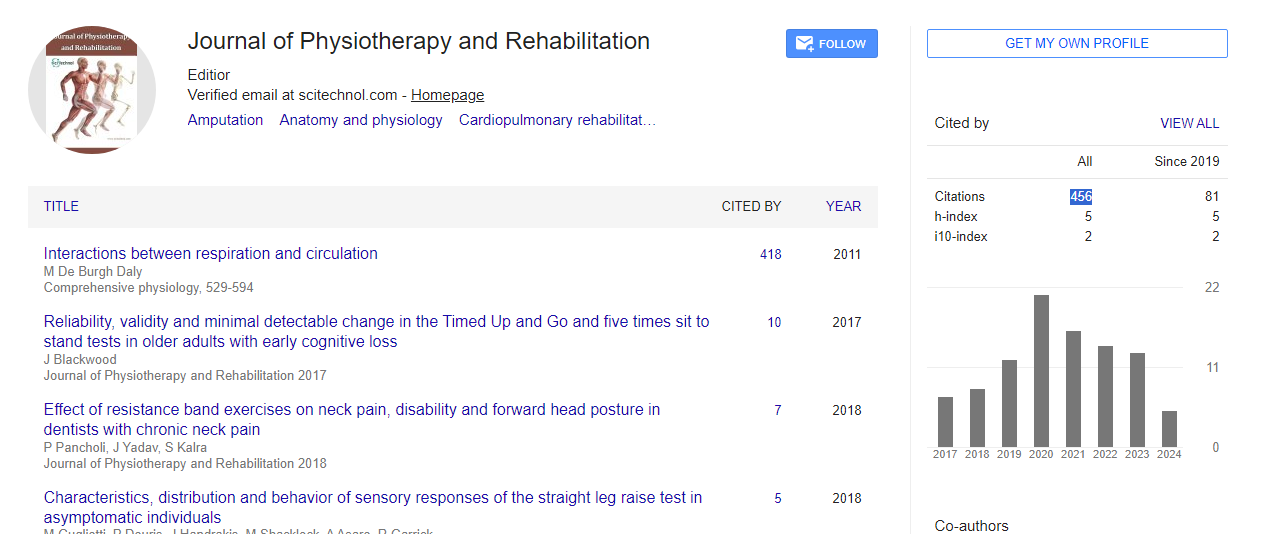Opinion Article, J Physiother Rehabi Vol: 8 Issue: 3
Psychological Disorders and Physiotherapy: Integrative Care Approaches for Mental Health Support
Boian Lisa*
1Department of Physiotherapy, University of Tasmania, Launceston, Australia
*Corresponding Author: Boian Lisa,
Department of Physiotherapy, University of
Tasmania, Launceston, Australia
E-mail: lisabon@edu
Received date: 28 May, 2024, Manuscript No. JPTR-24-140183;
Editor assigned date: 30 May, 2024, PreQC No. JPTR-24-140183 (PQ);
Reviewed date: 13 June, 2024, QC No. JPTR-24-140183;
Revised date: 21 June, 2024, Manuscript No. JPTR-24-140183 (R);
Published date: 28 June, 2024, DOI: 10.4172/JPTR.1000162.
Citation: Lisa B (2024) Psychological Disorders and Physiotherapy: Integrative Care Approaches for Mental Health Support. J Physiother Rehabi 8:3.
Description
In recent years, the role of physiotherapy in mental health care has expanded beyond physical rehabilitation to encompass integrative approaches that address psychological well-being. Traditionally, physiotherapy has been associated with the treatment of musculoskeletal injuries, neurological disorders, and chronic pain management. However, the understanding of the mind-body connection and the impact of physical activity on mental health has prompted a transformation in physiotherapy practice. Today, physiotherapists are increasingly recognized for their role in promoting mental well-being through targeted interventions that enhance physical function, alleviate symptoms of psychological disorders, and improve overall quality of life.
Integrative care approaches
Physical activity is well-established as a powerful tool in promoting mental health. Exercise stimulates the release of endorphins, serotonin, and other neurotransmitters that contribute to improved mood, reduced anxiety, and enhanced cognitive function. Physiotherapists employ tailored exercise programs that not only target physical impairments but also address psychological symptoms such as stress, depression, and anxiety. For example, aerobic exercises, strength training, yoga, and mindfulness-based practices are integrated into treatment plans to promote relaxation, boost self-esteem, and foster a sense of well-being.
Biofeedback techniques, such as Electromyography (EMG) and Heart Rate Variability (HRV) monitoring, enable physiotherapists to teach patients to control physiological responses to stress and anxiety. By providing real-time feedback, these techniques help individuals develop self-regulation skills and reduce symptoms of psychological distress. Incorporating relaxation techniques, such as progressive muscle relaxation and diaphragmatic breathing, further enhances stress management and promotes emotional stability.
Central to integrative care approaches is the concept of patientcentered care, which emphasizes collaboration, empowerment, and individualized treatment planning. Physiotherapists work closely with patients to set realistic goals, monitor progress, and adapt interventions based on evolving needs and preferences. By involving patients in decision-making and fostering a supportive therapeutic alliance, physiotherapy promotes autonomy and enhances motivation for sustained engagement in treatment.
Case studies and clinical evidence
Numerous studies have documented the benefits of physiotherapy interventions in improving mental health outcomes across various populations:
Post-Traumatic Stress Disorder (PTSD): Studies have shown that combining physical activity with trauma-focused therapy enhances treatment outcomes for individuals with PTSD, reducing hyperarousal and improving emotional regulation.
Chronic pain and psychological distress: Physiotherapy interventions, such as cognitive-behavioral approaches and pain education, help individuals manage chronic pain conditions while addressing associated psychological distress and disability. While the integration of physiotherapy in mental health care is promising, several challenges exist:
Interdisciplinary collaboration: Effective management of psychological disorders often requires collaboration with mental health professionals, such as psychologists and psychiatrists, to ensure comprehensive care.
Stigma and awareness: Overcoming stigma associated with seeking mental health support through physiotherapy remains a barrier for some patients. Education and advocacy efforts are needed to raise awareness about the benefits of integrative care approaches.
Resource allocation: Adequate resources, training, and support are essential to enable physiotherapists to deliver evidence-based interventions and effectively address the complex needs of patients with psychological disorders.
Conclusion
Integrative care approaches in physiotherapy represent a holistic and effective strategy for supporting mental health alongside physical rehabilitation. By incorporating physical activity, biofeedback techniques, and patient-centered care principles, physiotherapists play a vital role in enhancing the well-being of individuals with psychological disorders. Continued research, interdisciplinary collaboration, and advocacy efforts are essential to further integrate mental health support into physiotherapy practice, ultimately improving outcomes and quality of life for patients worldwide.
 Spanish
Spanish  Chinese
Chinese  Russian
Russian  German
German  French
French  Japanese
Japanese  Portuguese
Portuguese  Hindi
Hindi 